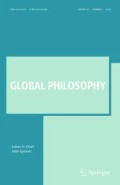Abstract
The philosophy of Hedwig Conrad-Martius represents a very important intersection point between phenomenological research and the natural sciences in the twentieth century. She tried to open a common pattern from the ontology of the physical being up to anthropology, passing from the biological sciences. An intersection point that, for the particular features of her thought, is rather a perspective point from which to observe, in an interesting and original way, both natural sciences and phenomenology. The 1923 essay entitled Real Ontology (Conrad-Martius 1923) is the starting point for her reflections about science, but it is also the point that marks a separation from Husserl (for a detailed discussion, see: Ales Bello 2003, pp. 184–195), even if not from phenomenology. A fundamental question is faced: “why something instead of nothing?” or: “what is the reality?,” shifting the focus from essence to existence. Whichever the answer, a deeply realistic position must be assumed, based on the assumption of a clear distinction between the subject and the world, and the possibility of knowledge, intended as adaequatio of the subject’s intellectus to the external reality.
Similar content being viewed by others
Notes
Plato, Timaeus, 56.
Bergson (2007).
Driesch (2006).
Ales Bello (2003, p. 215).
Conrad-Martius (1961).
Lovelock (1995).
Plato, cit., 30.
Plotinus, Enneades, V 1, 2.
Bohr (1958).
Planck constant is usually indicated by h; its value is: 6,626 · 10−34 Js.
Galleni and Forti (1999).
Rosen (2000).
Rosen (1991).
Categories theory deals with a further abstraction level after the basic one from sets to numbers (from three flowers, three stones…to number three), and the second one from numbers and geometrical objects to algebraic structures (groups, rings, etc.).
Kauffman (1993, Chap. 1).
Conrad-Martius (1965).
Kauffman (1995).
References
Ales Bello A (2003) L’universo della coscienza. Introduzione alla fenomenologia di Edmund Husserl, Edith Stein, Hedwig Conrad-Martius. ETS, Pisa
Bergson H (2007) In: Ansell-Pearson K, Kolkman M (eds) Creative evolution. Macmillan, Palgrave
Bohr N (1958) Atomic physics and human knowledge. Wiley, New York
Conrad-Martius H (1923) Realontologie. Jahrbuch für Philosophie und phänomenologische Forschung VI:159–333
Conrad-Martius H (1938) Ursprung und Aufbau der lebendigen Kosmos. Otto Mueller, Salzburg–Leipzig
Conrad-Martius H (1961) Der Selbstaufbau der Natur. Kösel Verlag, Munich
Conrad-Martius H (1965) Avé-Lallemant E (ed) Die Frage der Abstammung des Menschen in Schriften zur Philosophie, vol III. Kösel Verlag, Munich
Driesch H (2006) The history and theory of vitalism (1914). Hesperides Press
Galleni L, Forti M (1999) An axiomatization of biological concepts within the foundational theory of E. De Giorgi. Riv Biol/Biol Forum 92:77–104
Kauffman SA (1993) The origins of order. Self-organization and selection in evolution. Oxford University Press, New York
Kauffman SA (1995) At home in the universe: the search of the laws of self-organization and complexity. Oxford University Press, New York
Lovelock JE (1995) The ages of Gaia: a biography of our living earth updated and revised. Norton and Company, New York
Rosen R (1991) Life itself. A comprehensive inquiry into the nature, origin and fabrication of life. Columbia University Press, New York
Rosen R (2000) Essays on life itself. Columbia University Press, New York
Acknowledgment
The author is very grateful to Elena Maria Pellini for her careful reading of the manuscript and helpful suggestions.
Author information
Authors and Affiliations
Corresponding author
Rights and permissions
About this article
Cite this article
Cordelli, A. Hedwig Conrad-Martius’ Phenomenological Approach to Life Sciences and the Question of Vitalism. Axiomathes 18, 503–514 (2008). https://doi.org/10.1007/s10516-008-9043-2
Received:
Accepted:
Published:
Issue Date:
DOI: https://doi.org/10.1007/s10516-008-9043-2




